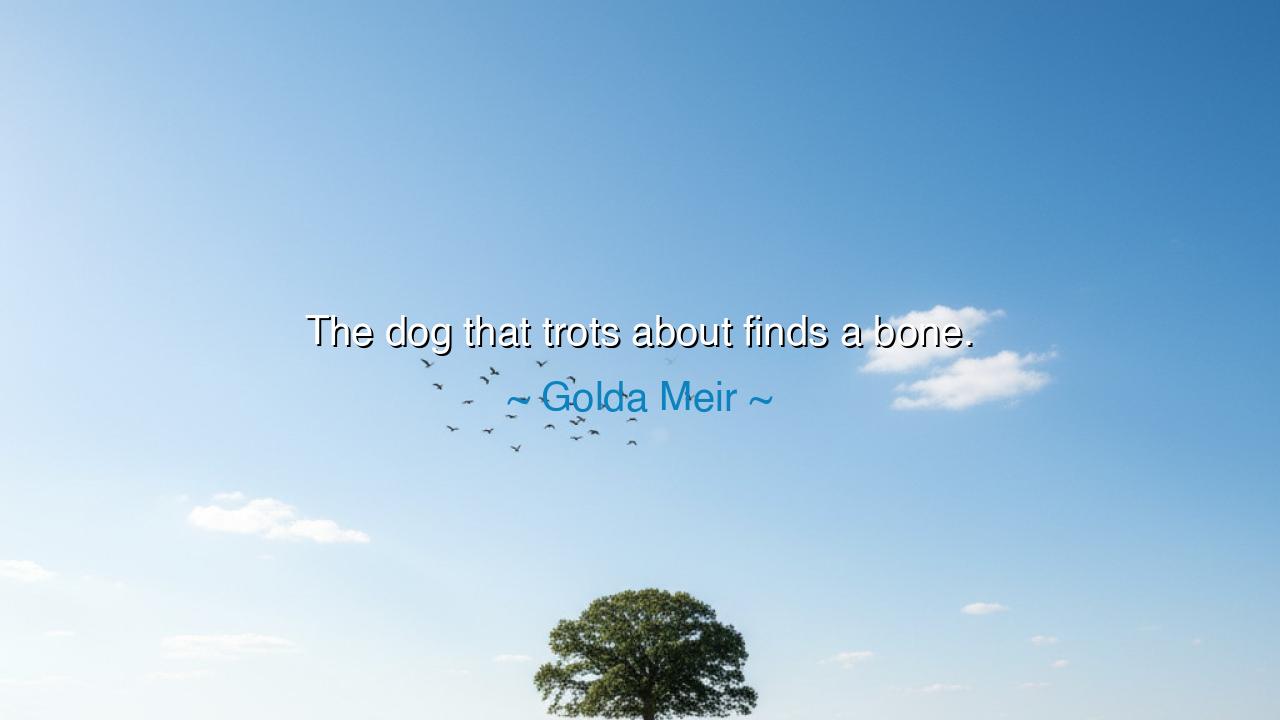
The dog that trots about finds a bone.






In the words of Golda Meir, a leader forged in the fire of struggle and the weight of responsibility, we are given a saying that glimmers with both simplicity and wisdom: “The dog that trots about finds a bone.” At first it may sound like a rustic proverb, a lesson in persistence dressed in homely imagery. Yet within it lies a profound truth of human endeavor—that opportunity belongs not to those who sit still, but to those who move, search, and remain restless in pursuit. The one who goes out, who explores, who tries again and again, will sooner or later stumble upon reward.
The origin of this wisdom can be found in Meir’s own life. Born in hardship, she emigrated, labored, and struggled before rising to become one of the most influential prime ministers of Israel. Nothing in her life was handed down as a gift; everything was discovered, built, or won through effort and persistence. She knew from experience that those who wait for fortune to arrive often starve, but those who keep moving—even with small, uncertain steps—will find sustenance. Her words reflect not only her philosophy of leadership but the hard-earned truth of survival.
History confirms this law. Consider the story of Christopher Columbus, who sought a westward path to Asia. He faced rejection, ridicule, and long delays, yet he persisted in his “trotting about.” His quest did not yield the prize he had envisioned, but it uncovered a new world, changing the course of history forever. Had he remained idle, content with what was known, the bone of discovery would never have been his. The restless spirit, always moving, always seeking, is the one that uncovers treasures.
The ancients too honored this principle. Diogenes, the wandering philosopher, carried his lantern through the streets of Athens, searching for an honest man. He was mocked, yet his relentless search gave birth to insights that endure to this day. Even if his “bone” was not found as he intended, the act of searching itself yielded wisdom. In the same way, the dog that trots about may not always find the bone he expected, but he will find something—and that something may change his destiny.
The meaning of Meir’s words is both practical and profound. They tell us that effort itself is a kind of magic, that those who move create the possibility of discovery, while those who remain still guarantee nothing. The bone is not reserved for the most gifted or the most fortunate—it belongs to the one who does not give up the search. Action, not chance, is the mother of opportunity.
The lesson for us is eternal: keep moving. When doors close, try others. When failures come, let them spur you forward rather than chain you to despair. It is not brilliance alone that ensures success, but persistence, curiosity, and the willingness to seek in places others will not. Life scatters its bones in unexpected fields, and only those who trot about, alert and determined, will find them.
Practical counsel is this: each day, take a step forward, however small. Seek out new knowledge, pursue new opportunities, knock on doors, and venture into unknown paths. Do not despise small beginnings, for each trot may carry you closer to the bone. Keep your eyes open and your spirit restless, for fortune favors those who are in motion. The idle may dream of bones, but the trotting dog finds them.
Thus, Golda Meir’s words echo as a timeless command: “The dog that trots about finds a bone.” Children of tomorrow, remember this teaching. Do not wait for fortune to fall into your hands. Move, search, persevere, and life will yield its rewards. For in the end, it is not the one who waits, but the one who wanders with courage and persistence, who discovers the hidden treasures of the world.






AAdministratorAdministrator
Welcome, honored guests. Please leave a comment, we will respond soon